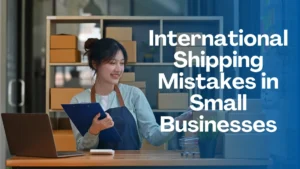Going global with your small business opens exciting new doors, but international shipping can quickly become a nightmare if you’re not prepared. From customs delays to confusing documentation, the smallest error can cost time, money, and customer trust. Many small businesses jump into international shipping without understanding the risks, leading to costly shipping mistakes to avoid.
This guide is here to help. Whether you’re sending products from Pakistan to Canada or fulfilling orders in the UAE, mastering international shipping for small businesses starts with learning what not to do. Below, we cover the most common errors and how to avoid them, so your business can scale globally without hitting unnecessary roadblocks.

Why International Shipping Can Be Tricky for Small Businesses
Common Pain Points Small Businesses Face in Global Shipping
Cross-border delivery challenges aren’t always visible until it’s too late. Small businesses often face shipping problems in international trade such as confusing regulations, language barriers, or unreliable tracking. Without a solid logistics foundation, these global shipping risks can lead to delays, lost parcels, and unhappy customers.
From fluctuating customs fees to complex paperwork, global shipping is far more than just sticking a label on a box. Smaller companies, especially those without a dedicated logistics team, often struggle to stay compliant while keeping costs in check. Understanding these early can make all the difference in your international growth.
Mistake #1: Inaccurate or Incomplete Shipping Documentation
Why HS Codes and Commercial Invoices Matter
One of the most common international shipping mistakes is submitting inaccurate shipping documentation. Missing or incorrect details on customs forms, invoices, or export paperwork can delay shipments or lead to penalties. Many small businesses overlook the importance of HS code accuracy, leading to customs clearance issues and added fees.
To stay compliant, always double-check your shipping documentation checklist. Include the correct harmonized system (HS) codes, ensure your commercial invoice matches your declared goods, and understand trade compliance requirements. Documentation errors not only slow down shipments but can also raise red flags with customs authorities, damaging your reliability.
Mistake #2: Not Understanding Incoterms and Delivery Responsibilities
How Incoterms Protect Your Business from Hidden Costs
Incoterms for small businesses can seem complicated, but they’re essential to prevent disputes over delivery responsibility in shipping. Without clear terms, you may be held responsible for unexpected duties and taxes or additional logistics fees you didn’t budget for.
Understanding which party, buyer or seller, is responsible for freight, insurance, and customs duties can protect your margins. International shipping regulations often shift responsibilities mid-journey if terms aren’t well-defined. Mastering Incoterms helps you avoid hidden costs and ensures smooth delivery from warehouse to customer.
Mistake #3: Choosing the Wrong Shipping Partner or Carrier
Why Cheapest Isn’t Always Best
Many small businesses fall into the trap of choosing the cheapest provider, only to face international shipping delays, unresponsive support, or unexpected surcharges. Choosing the right freight partner goes beyond just price. You need reliability, good tracking systems, and solid customer service.
Unreliable courier services can lose or delay packages, leading to angry customers and refund requests. Avoid these carrier selection mistakes by vetting providers with international experience, performance guarantees, and responsive communication channels.
Mistake #4: Poor Packaging and Labeling Practices
Avoid Damage and Delays with Smart Packaging
Packaging problems can ruin your reputation. Poor packaging damage is one of the leading causes of returns and claims in global e-commerce. Fragile or perishable items need secure, climate-sensitive packaging that withstands long journeys and varied handling.
Also, shipping label errors can cause customs delays or misdelivery. Follow international parcel packaging tips by using proper materials, accurate labels, and weather-resistant wraps. Don’t just think about presentation, think protection.
Mistake #5: Underestimating Total Landed Cost
Calculate Everything, Not Just Freight
Freight charges are just one piece of the puzzle. Total landed cost includes hidden shipping fees, duties, taxes, insurance, and storage. Many small businesses make the mistake of calculating only base transport charges and are blindsided by surprise expenses.
Duties and tax calculations vary by country and product. Failing to include the full cost of global shipping in your pricing strategy can crush your profit margins. Always run a cost breakdown before quoting international customers.
Mistake #6: Ignoring Customs and Country-Specific Regulations
Why Compliance Is Non-Negotiable
Each country has its own import laws, documentation requirements, and prohibited item lists. Ignoring these can lead to customs clearance issues, legal trouble, or shipments being destroyed. Trade restrictions are serious, and often updated without warning.
Research country-specific import laws before exporting. What’s acceptable in one country may be banned in another. Staying informed and compliant helps you avoid the most critical international shipping mistakes.
Mistake #7: No Contingency Plan for Delays or Losses
Prepare for What Can Go Wrong
International shipping isn’t perfect. Weather, customs inspections, and political issues can cause shipping delays and losses. Yet many small businesses have no risk mitigation for logistics.
Don’t ship without freight insurance or real-time shipment tracking. These tools not only reduce losses but also provide peace of mind. If something goes wrong, having a contingency plan ensures you can quickly respond, replace, or refund.
Bonus Tip: Use Experts & Tools to Avoid These Mistakes
Partnering with Freight Forwarders and Logistics Pros
If you want to avoid costly delays, customs headaches, and lost shipments, don’t try to manage everything yourself. Working with trusted freight forwarders can save your business time and stress, especially when dealing with cross-border documentation and regulations.
Leverage modern international shipping tools to track packages in real time, compare carrier rates, automate customs forms, and manage returns. These digital solutions are game-changers for small businesses entering the global market.
Most importantly, don’t assume international logistics has to be expensive. With the right partners, you can unlock affordable global shipping solutions that help you scale without draining your budget.
Final Thoughts
Growing globally is exciting, but it comes with its share of logistics challenges. Following these small business shipping tips will help you make smarter decisions and streamline your fulfillment process.
From choosing the right shipping mode to leveraging tools and expert partnerships, staying proactive is how you avoid costly international shipping mistakes before they impact your bottom line.
By planning ahead and choosing partners that align with your goals, you’ll be well on your way to building a successful global shipping strategy that supports long-term growth and customer satisfaction.


